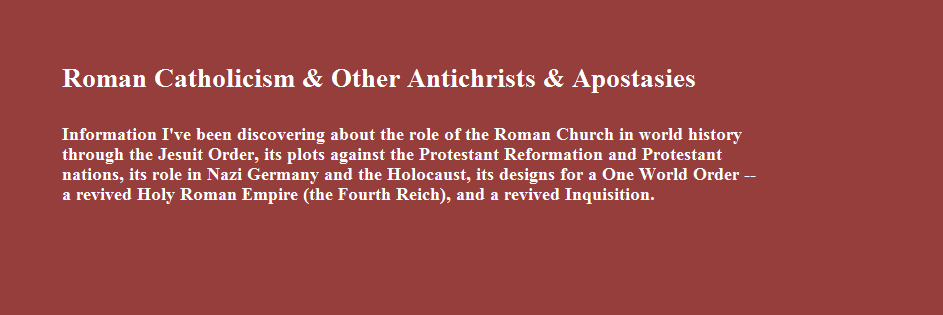The Protestant Reformation was the 16th-century schism within Western Christianity initiated by Martin Luther, John Calvin and other early Protestants.What's wrong with this?
The word "schism" implies that the Protestant Reformation was nothing more than a division BETWEEN Christian churches, and of course implies that this was a serious error by the Protestants themselves, as a mere schism would be a violation of scripture.
It was not a schism, it was an absolute rejection of the Roman Catholic church by Catholics themselves, mostly priests, who had come to recognize that Rome was not Christian at all but in fact the Harlot Church of the Book of Revelation, and that the papacy is the seat of the Antichrist, or "man of sin."
It was a total condemnation of Rome, it was no "schism."
It was sparked by the 1517 posting of Luther's Ninety-Five Theses. The efforts of the self-described "reformers", who objected to ("protested") the doctrines, rituals, and ecclesiastical structure of the Roman Catholic Church, led to the creation of new national Protestant churches. The Reformation was precipitated by earlier events within Europe, such as the Black Death and the Western Schism, which eroded people's faith in the Catholic Church and the Papacy that governed it. This, as well as many other factors, such as the mid 15th-century invention of the printing press, and the fall of the Eastern Roman Empire, contributed to the creation of Protestantism.[1]This is hardly more than a complicated Red Herring to distract from the real issues, the violations of the Church of Rome of the principles of Christianity and especially the true gospel of salvation. It's kind of a word salad of irrelevant facts designed to put the reader to sleep. Trying to pin the Reformation on the circumstances of the time rather than the moral and theological enormities of Rome is jesuitical deviousness.
It's a very long article too, no doubt full of all kinds of scholarly facts and even some truth, but with a beginning like the above there is no doubt in my mind that the whole point is to lead the reader away from the truth down dozens of primrose-bordered rabbit trails.
Perhaps I'll be back with more.
